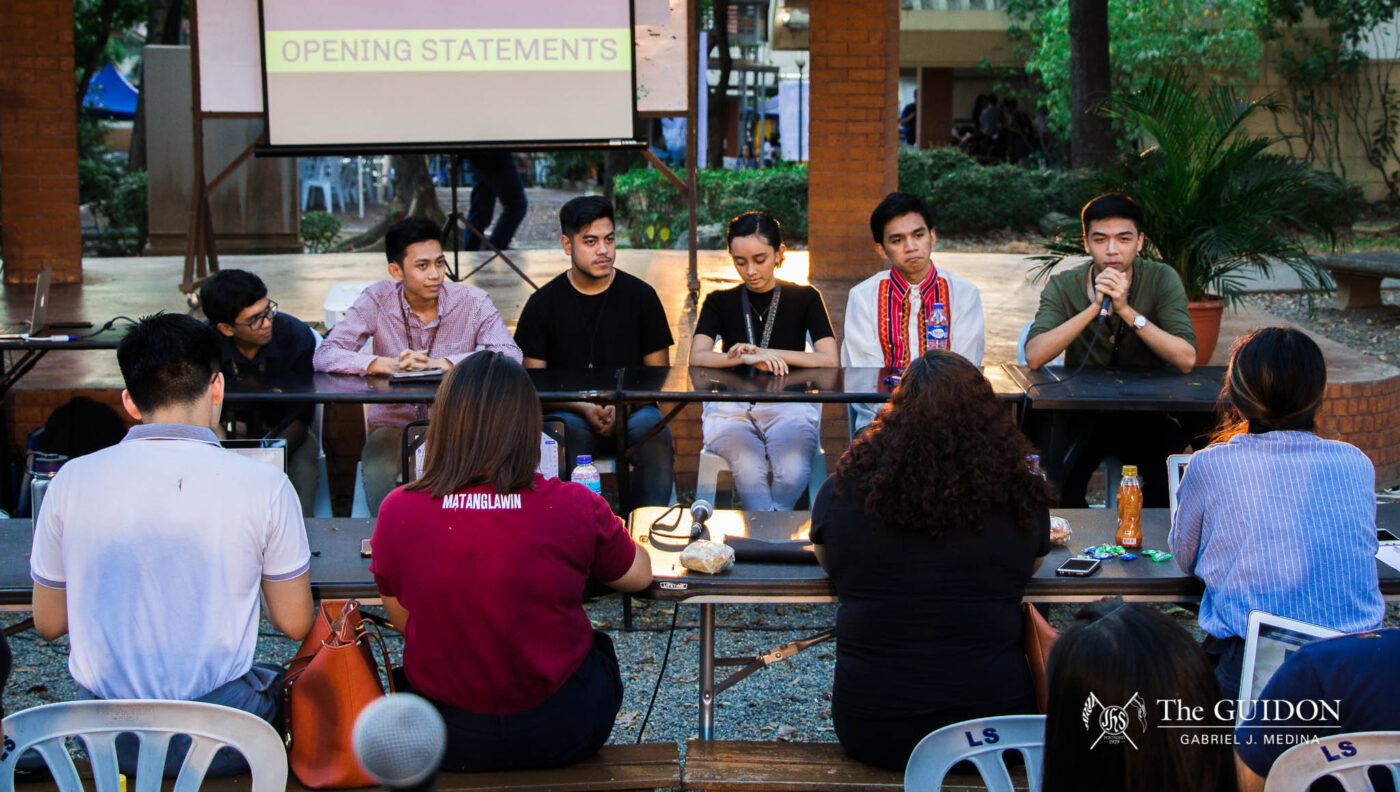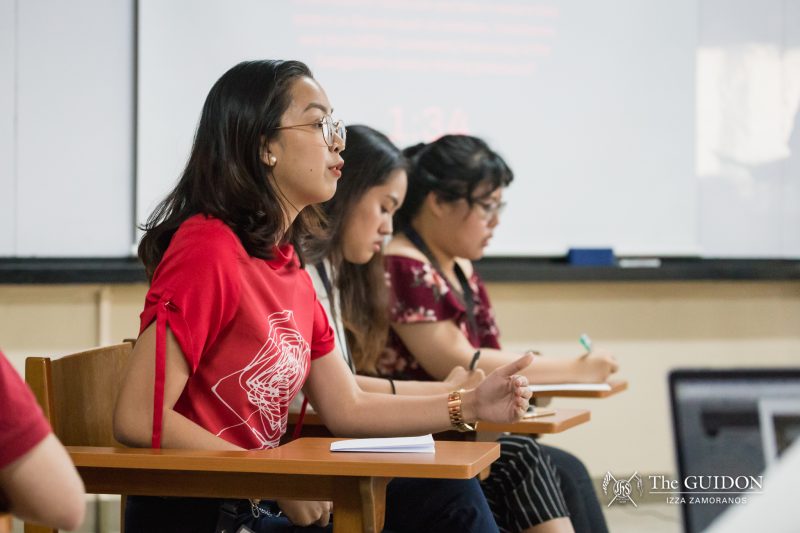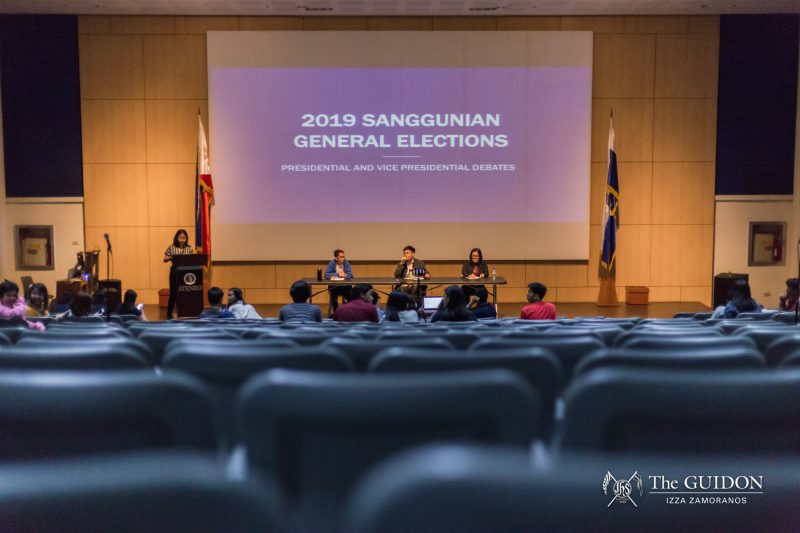Presidential, vice presidential, and SOH representative candidates convened to discuss University-wide concerns and national issues in the 2019 Sanggunian Special Elections miting de avance and debates at the Zen Garden last April 1.
Running independently were presidential bet Quiel Quiwa (4 BS EcE) and vice presidential candidates Jb Bejarin (1 AB POS-MPM), JT Valiente (3 AB DS), and Moirah Isabelo (1 AB COM). Candidates from the Transformative Empowerment of the Atenean (TEA) Coalition included James Carreon (3 AB POS) for vice president and Matt Rodriguez (2 BFA CW) for School of Humanities (SOH) representative. TEA Coalition’s presidential candidate, Austin Sy (3 AB-MA POS) withdrew his candidacy on the afternoon of April 1 due to undisclosed personal reasons. There were no candidates for the School of Science and Engineering (SOSE) representative position.
The panelists for the debates were The GUIDON’s Features Editor Jayvee del Rosario and Features writer Kayla Cadenas, along with Matanglawin Ateneo’s Punong Patnugot Jessica Gayo and Ingat Yaman at Tagapamahala ng Social Media Celine Natividad.
The Ateneo Commission on Elections announced the Special Elections after the 2019 Sanggunian General Elections abstentions left the presidential, vice presidential, and SOH representative seats vacant. This is the first Special Elections to be organized since the abolition of the electoral quota in 2016.
Addressing student concerns
During the discussion on university-related issues, Isabelo was asked about her stance on anonymous social media accounts as avenues to voice dissent and criticism.
The primary example cited in the question was the “Abstain4Sanggu” Twitter account that surfaced on March 12 after the 2019 Sanggunian General Elections debates, which asserted the need for better candidates and called for an en masse Abstain vote. This account has since been deleted.
Isabelo stated that while anonymous accounts are valid mediums for dissent, she believes that there are more proactive ways to voice out concerns such as through the Sabihin sa Sanggu (SSS) initiative.
Panelist Gayo then asked Isabelo a follow-up question about what can be considered as success indicators of processing complaints through SSS versus anonymous pages like ADMU Freedom Wall and Abstain4Sanggu. Isabelo responded that unlike the aforementioned platforms, SSS releases regular updates through their Facebook page on the status of a complaint forwarded to the University offices concerned.
Presidential candidate Quiwa was then asked about how he plans to fill in the vacancy for SOSE representative—the supposed champion for SOSE students’ concerns—given the lack of candidates during the 2019 General Elections and Special Elections.
In response, Quiwa proposed that the Sanggunian partner with the Science and Technology cluster of the Coalition of Organizations of the Ateneo and the University’s SOSE departments to encourage SOSE student participation with the student government.
Protecting constituents
Apart from discussing their stances on the development of student politics and governance, the candidates engaged in discussions regarding their plans to ensure student safety. The concern of security for students both on and off campus was brought up in light of the recent reports of crime near the campus.
Quiwa was asked about how the Sanggunian can better ensure student safety along Katipunan given the recent stabbing incident of a Loyola Schools (LS) student. Quiwa suggested forming partnerships with establishments along Katipunan and collaborating with campus security. He also said that establishing more security stations throughout Katipunan would help to increase safety in the streets outside the campus.
Though Quiwa acknowledged that he is not yet familiar with the University’s security measures and the protocols of offices and authorities outside the LS, he assured that he is willing to make the time to learn about these processes.
Panelist Gayo raised another question on student security when she asked candidates about their stance on the alleged red-tagging of student organizations in the Ateneo—an issue that resulted in controversial answers in the 2019 Sanggunian General Elections debates for school representative candidates. She questioned candidates further about the measures the Sanggunian can take to prevent this from happening.
SOH Representative candidate Rodriguez mentioned how the red-tagging seemed to be “done from within the Sanggu.” He emphasized that in light of the red-tagging of groups in Ateneo, there is a need for discussion and unity in the Sanggunian so that “conflicting ideologies” do not “get in the way” of student safety.
Following this, vice presidential candidate Isabelo proposed that a student rights desk—a project of the 2017-2018 Sanggunian that did not come to fruition due to lack of manpower—could help Sanggunian pinpoint where the red-tagging is coming from and to protect students from the infringement of their rights.
The debates further delved into the discussion about the safety of University students within the context of the recent withdrawal of the Philippines from the International Criminal Court.
Quiwa urged the Sanggunian to focus on “protecting its students” and to “encourage” students to “voice dissent and get involved” amidst the withdrawal of the country from the international criminal tribunal. “Kailangan natin intindihan ang boses natin bilang institusyon. Magsasalita tayo kung may nailalabag na Atenistang values. Hindi tayo bubble,” Quiwa said.
(We need to understand our voice as an institution. We need to speak when our values as Ateneans are infringed upon. We are not in a bubble.)
Assuring the Sanggunian’s continuity
Amidst the discussion of student involvement with national politics, the debates also facilitated discussion of the candidates’ plans for developing a structurally and politically stable Sanggunian. Management economics junior Kevin Choa questioned the candidates regarding their ideas for succession planning within the Sanggunian. Choa noted that candidates on their junior year will be graduating the following year, regardless of the results of the elections.
Rather than planning for succession within the Sanggunian, candidate Bejarin stated that he aims to focus on “breeding student leaders.” He also hopes to develop the student government to become more “inclusive” in providing opportunities for people to join the Sanggunian.
Further discussions on the engagement of students with the Sanggunian were brought up when candidate Carreon was asked about how he could mitigate the trend of the Sanggunian General Elections regularly ending with a low voter turnout. Carreon asserted that constituents who regularly choose not to vote in the Sanggunian’s General Elections are unaware of how the Sanggunian may serve them. He noted that once students understand what the Sanggunian can do, “they will be encouraged to vote.”
Panelist Cadenas noted that Carreon’s push for the greater visibility of the Sanggunian is a “repeated rhetoric” regarding the work of the student government and suggested that the emphasis on visible projects be changed to prioritize project effectiveness instead.
Carreon acknowledged the need for effectiveness to be prioritized and explained his platform on improved visibility as based on informing students about the capabilities of the Sanggunian and possible collaborations with student organizations.
Reaching beyond the University
During the segment on national issues, the proposed construction of the Kaliwa Dam in Quezon was brought up. Panelist Cadenas asked Bejarin how he plans to convince students to engage with the issue. Bejarin noted that it is then important to get the help of organizations that can “contextualize the issues of the dam” to Ateneans. He also stated that the students must be committed to helping people with different backgrounds. “Sa dulo po ng araw (At the end of the day), [I believe] inside each Atenean is a heart,” he said.
Bejarin also stressed the necessity of protesting Kaliwa Dam because of the projected damage its construction would inflict on communities of indigenous peoples (IP).
Partnerships with IP communities were again brought up when Panelist Gayo and Matanglawin Ateneo member Genesis Gamilong questioned Quiwa about how he might lobby for student interaction with IPs, given the “developing” status of the Lakbayan initiative in the University. The same question was directed to the 2019 Sanggunian General Elections Presidential candidate Samantha Que whose answer sparked controversy online.
Quiwa noted that logistics and security are “not a pressing concern” for these projects in collaboration with IPs, as “similar programs have been done before on campus.” He stressed the need for the involvement of people that are knowledgeable not only of advocacies for IPs, but also of the University’s administrative processes.
He also acknowledged the need to involve the larger Ateneo community in sectoral dialogue.
“Yung pagbubukas natin ng pinto [ay] hindi lang pagbubukas para pumunta sila, pero para lumabas din tayo… Iparamdam [natin sa] lahat na bahagi tayo ng isang komunidad ng mga Pilipino,” he said.
(We open our doors, not only to welcome others in, but for us to step out and reach out as well. Let us make everyone feel that we are all part of the Filipino community.)






